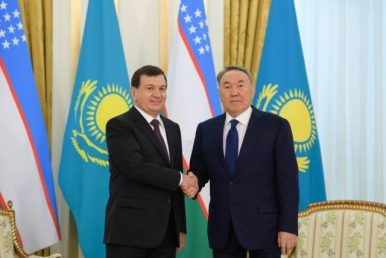 Uzbek President Shavkat Mirziyoyev visited his Kazakh counterpart Nursultan Nazarbayev in Astana.
Uzbek President Shavkat Mirziyoyev visited his Kazakh counterpart Nursultan Nazarbayev in Astana.
A few weeks after making his first foray abroad — a two-day trip to Turkmenistan — Uzbek President Shavkat Mirziyoyev traveled to Astana, Kazakhstan to meet with his counterpart and further cement his growing reputation as a good neighbor, dedicated to patching up Tashkent’s previously shaky regional relations.
Kazakh President Nursultan Nazarbayev welcomed Mirziyoyev warmly. “Uzbekistan is our strategic partner, neighbor and brotherly country,” he said at a joint press conference following their meetings.
Uzbekistan and Kazakhstan have not always been the best of brothers. Nazarbayev, a long-time proponent of regional integration initiatives, never quite found a receptive partner in Uzbekistan’s first president, Islam Karimov. Karimov guarded Uzbekistan’s independence fiercely, to the point of removing the country from the CSTO (twice), eschewing the nascent Eurasian Economic Union, and periodically closing its borders. As Uzbekistan borders every other Central Asian state, it’s participation in pan-regional projects was desired but not always forthcoming.
In any case, Nazarbayev did not speak ill of the dead, calling Karimov “my great friend.”
Nazarbayev nonetheless nodded to the change in tone in the bilateral relationship — “Recently, our relations have developed in a totally different way” — and highlighted tangible evidence of improved relations. In the fourth quarter of 2016, he said, trade turnover increased by 30 percent. “This is thanks to how the new leadership in Uzbekistan has open all opportunities to trade and lifted barriers.”
“There are no unresolved issues between Uzbekistan and Kazakhstan — not territorial, not with the borders, not with politics or the economy. We are open, like a blank page that is to be filled with good deeds that will benefit our peoples,” Nazarbayev said.
In his first weeks as interim president, Mirziyoyev placed particular emphasis on sparking progress in border negotiations. Uzbekistan has had unresolved border issues with most of its neighbors since independence, including Kyrgyzstan, Tajikistan, and Kazakhstan. It seems the progress on settling the Kazakh-Uzbek border truly was phenomenal.
Both sides expect to see trade grow as relations warm. According to RFE/RL, Nazarbayev said that the two leaders would sign 75 contracts worth nearly $1 billion at a Kazakh-Uzbek business forum on March 23. (EurasiaNet says the ultimate raft of deals was bigger: 92 agreements worth a total of $840 million.) The exact number of deals — and whether they lead to actual business — aside, leaders from the two countries signed a number of agreements indicative of where they mutually see the relationship going: a joint declaration on “Further Enhancement of Strategic Partnership and Strengthening Good-neighborliness,” an agreement on “Interregional Cooperation, Strategy of Economic Cooperation for 2017-2019,” and an agreement on “International Road Transport.”
Kazakhstan and Uzbekistan are the region’s largest states. Uzbekistan has the population advantage, with more than 30 million to Kazakhstan’s 17 million; but Kazakhstan has had the economic advantage with a GDP of $184.4 billion in 2015, to Uzbekistan’s $66.7 billion. Uzbekistan, however, has not seen its GDP fall in the way Kazakhstan has in the past few years as Russia’s economy tanked and oil prices collapsed. (This graph of World Bank data is telling in this regard. Interestingly, prior to 1998, Uzbekistan had the GDP upper hand.)
As the two states move from signed deals to tangible (and sustained) trade and bilateral business growth — it will be interesting to watch how competition – both business and political – impacts the relationship. For much of the last two decades, Kazakhstan has been the unchallenged top Central Asian economy and diplomatic entity, making concerted efforts to position itself as a global player. Uzbekistan has not. While Mirziyoyev has purposefully focused on regional relationships, one shouldn’t downplay Uzbekistan’s potential.
Mirziyoyev referred to his visit as historic, noted that the two leaders agreed to meet more frequently, and extended an invitation for Nazarbayev to make a visit to Uzbekistan.
Thediplomat.com, 24.03.2017




